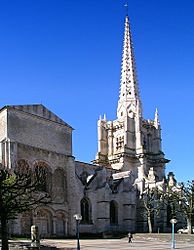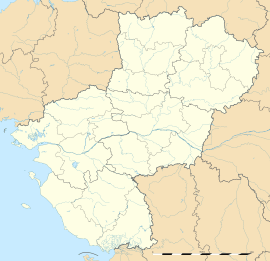Luçon facts for kids
Quick facts for kids
Luçon
|
||
|---|---|---|
 |
||
|
||
| Country | France | |
| Region | Pays de la Loire | |
| Department | Vendée | |
| Arrondissement | Fontenay-le-Comte | |
| Intercommunality | Pays né de la mer | |
| Area
1
|
31.52 km2 (12.17 sq mi) | |
| Population
(Jan. 2019)
|
9,554 | |
| • Density | 303.11/km2 (785.05/sq mi) | |
| Time zone | UTC+01:00 (CET) | |
| • Summer (DST) | UTC+02:00 (CEST) | |
| INSEE/Postal code |
85128 /85400
|
|
| 1 French Land Register data, which excludes lakes, ponds, glaciers > 1 km2 (0.386 sq mi or 247 acres) and river estuaries. | ||
Luçon is a charming commune located in the Pays de la Loire region of western France. It is part of the Vendée department. People who live in Luçon are called Luçonnais. The town is known for its rich history and beautiful buildings, especially its impressive cathedral. Luçon offers a mix of quiet French life and interesting sights to explore.
Contents
Geography of Luçon
Luçon is situated in the western part of France. It is about 30 kilometers (19 miles) from the Atlantic coast. The town lies in a flat area, which is part of the Poitou Marsh. This marshland is famous for its unique landscapes and waterways.
Location and Surroundings
The commune is surrounded by a mix of farmland and natural areas. Its location near the coast means it has a mild climate. This makes it a pleasant place to live and visit. The nearby marsh provides a habitat for many different plants and animals.
History of Luçon
Luçon has a long and interesting history that dates back many centuries. It was an important religious center for a long time. The town's most famous landmark, the Cathedral of Notre-Dame, shows its historical importance.
Early Beginnings
The area around Luçon was settled in ancient times. It grew into a significant town during the Middle Ages. Its location made it a key spot for trade and religious activities.
Religious Importance
Luçon became a diocese in the 14th century. This meant it was the main city for a bishop and his church area. The cathedral was built and rebuilt over many years, showing different styles of architecture. One of its most famous bishops was Cardinal Richelieu, who later became a very powerful minister in France. He was bishop of Luçon from 1606 to 1624.
Landmarks and Attractions
Luçon has several notable places that visitors enjoy. These sites reflect the town's history and culture.
Luçon Cathedral
The Cathedral of Notre-Dame de l'Assomption is the most famous building in Luçon. It has a tall, impressive spire that can be seen from far away. Inside, you can find beautiful stained-glass windows and historical art. The cathedral is a great example of Gothic architecture.
Public Gardens
The town also has lovely public gardens, known as the Jardin Dumaine. These gardens are a peaceful place to relax. They feature beautiful flowerbeds, trees, and walking paths. It's a popular spot for both locals and visitors.
Economy and Life in Luçon
The economy of Luçon is mainly based on agriculture and local services. Many people work in farming or in businesses that support the community.
Local Industries
Agriculture plays a big role in the surrounding area. The town also has small businesses and shops. These provide jobs and services for the people living in Luçon and nearby villages.
Community Life
Luçon is a lively town with a strong sense of community. There are local markets, festivals, and events throughout the year. These gatherings bring people together and celebrate the town's traditions.
Population
As of January 2019, Luçon had a population of 9,554 people. The population has been quite stable over the years. The town is a comfortable size, not too big and not too small.
See also
 In Spanish: Luçon para niños
In Spanish: Luçon para niños
 | Victor J. Glover |
 | Yvonne Cagle |
 | Jeanette Epps |
 | Bernard A. Harris Jr. |




